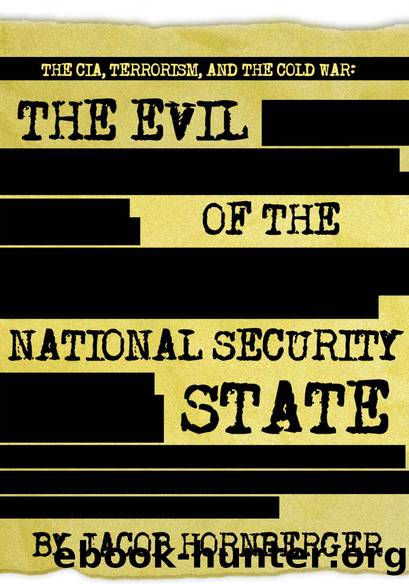The CIA, Terrorism, and the Cold War by Hornberger Jacob

Author:Hornberger, Jacob
Language: eng
Format: epub
Publisher: The Future of Freedom Foundation
Published: 2016-03-08T16:00:00+00:00
The Warren Commission
On January 22, 1964, the Warren Commission held a meeting that would be kept secret from the American people. The session was called to address the rumor that Oswald was a paid undercover agent for the FBI. After the session was over, former CIA Director Allen Dulles, who was serving on the Warren Commission, stated that the transcript of the session should be destroyed. The Commission went along with Dullesâs suggestion. Years later, it turned out that a court reporterâs tape had survived the destruction. Its release was secured by longtime Kennedy assassination researcher Harold Weisburg.
How did the Warren Commission resolve the issue? They asked FBI Director J. Edgar Hoover and CIA Director Richard Helms whether Oswald was, in fact, a U.S. intelligence operative. Both of them told the Commission that he was not, and that was the end of the matter.
The Commission obviously believed it had no choice but to accept the statements of both men at face value. After all, imagine the following headlines in the mainstream press: âWarren Commission Suggests CIA and FBI Lying about Oswald.â
Thatâs what the Commission would have been doing if it decided to delve more deeply into the matter â it would have been accusing Hoover and Helms of lying about Oswald. And how would the Commission have gone about investigating the matter? Obviously, both the FBI and the CIA would never have voluntarily turned over any documents indicating Oswaldâs position.
So even investigating the rumor would have required an extremely aggressive action against both the FBI and the CIA. The chance that that would happen was nil. After all, this was the height of the Cold War. A fierce battle between the Warren Commission and the U.S. national-security state would obviously have posed a grave threat to national security, especially by suggesting that the CIA and the FBI were liars and that the supposed assassin of John F. Kennedy was an operative of U.S. intelligence.
The Warren Commission looked into that abyss and quickly turned away by accepting the representations of the CIA and the FBI that Oswald wasnât a U.S. intelligence agent. After all, think about the potential ramifications if that was, in fact, what Oswald was. That would have converted Oswald from supposed lone-nut assassin to a supposed lone-nut CIA assassin. The Warren Commission would obviously have had a difficult time quickly reaching that conclusion without a serious investigation into Oswaldâs CIA activities.
Actually though, there was another likely reason â a much bigger reason â that the Warren Commission refused to seriously investigate whether Oswald was, in fact, a U.S. intelligence agent. That reason would also explain why U.S. officials were so adamant about preventing Kennedyâs autopsy from being conducted in Dallas, as required by Texas law, and instead placing it into the hands of the U.S. military.
What was that much bigger reason? It revolved around the two most important words in the lifetimes of the American people since the end of World War II: ânational security.â
Download
This site does not store any files on its server. We only index and link to content provided by other sites. Please contact the content providers to delete copyright contents if any and email us, we'll remove relevant links or contents immediately.
| Africa | Americas |
| Arctic & Antarctica | Asia |
| Australia & Oceania | Europe |
| Middle East | Russia |
| United States | World |
| Ancient Civilizations | Military |
| Historical Study & Educational Resources |
Machine Learning at Scale with H2O by Gregory Keys | David Whiting(4313)
Never by Ken Follett(3957)
Fairy Tale by Stephen King(3399)
Oathbringer (The Stormlight Archive, Book 3) by Brandon Sanderson(3217)
The Man Who Died Twice by Richard Osman(3081)
Will by Will Smith(2920)
Rationality by Steven Pinker(2366)
Can't Hurt Me: Master Your Mind and Defy the Odds - Clean Edition by David Goggins(2342)
The Dark Hours by Michael Connelly(2311)
Friends, Lovers, and the Big Terrible Thing by Matthew Perry(2230)
The Dawn of Everything: A New History of Humanity by David Graeber & David Wengrow(2210)
Principles for Dealing With the Changing World Order: Why Nations Succeed and Fail by Ray Dalio(2055)
A Short History of War by Jeremy Black(1849)
HBR's 10 Must Reads 2022 by Harvard Business Review(1845)
Go Tell the Bees That I Am Gone by Diana Gabaldon(1758)
A Game of Thrones (The Illustrated Edition) by George R. R. Martin(1746)
Kingdom of Ash by Maas Sarah J(1684)
515945210 by Unknown(1668)
443319537 by Unknown(1560)
